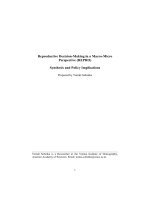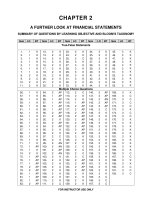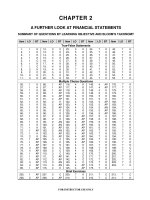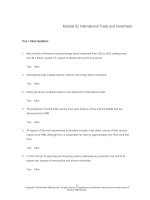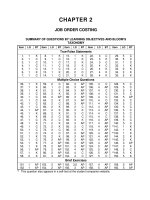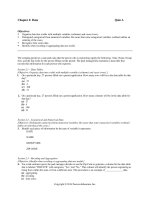Ethics for international business decision making in a global political economy
Bạn đang xem bản rút gọn của tài liệu. Xem và tải ngay bản đầy đủ của tài liệu tại đây (22.9 MB, 293 trang )
www.ebook3000.com
Ethics for International Business
Business takes place in an increasingly global environment, crossing political and cultural boundaries,
and consequently ethical dilemmas arise. The central focus of this successful and innovative text lies in
how to make and explain “best choice” judgments in international business situations.
The newly-updated version of this groundbreaking textbook continues to provide a topical and
relevant analysis of the ethical dimensions of conducting business in a global political economy. From a
starting point of applied ethics, the book introduces a common set of normative terms and analytical
tools for examining and discussing real case scenarios.
Extensive real-world examples, presented in the form of exhibits, cover issues including:
• foreign production, including sweatshops
• export of hazardous products
• testing and pricing of HIV/AIDS drugs
• advertising tobacco, alcoholic beverages and infant formula
• deceptive marketing techniques and bribery
• religious and social discrimination
• cultural impacts from “music, movies and malls”
• environmental issues, including oil spills, rain forest preservation, global warming and genetically
modified foods
• Internet censorship and privacy issues in China
• fair trade certification and consumer boycotts
• oil companies in the Sudan
• foreign investors in Burma
To keep pace with the changing landscape of global business, this new edition features:
•
•
•
•
•
Updated exhibits that introduce new issues and are sourced from more international publications
Increased coverage of issues arising in emerging markets
Updated descriptions and assessments of relevant international agreements
Seventeen new photographs that were chosen to accompany cases designed for classroom discussion
Three new figures that help depict the ethical analysis process
The continued globalization of business increases the relevance of this textbook and its unique focus on
specifically international ethical challenges faced by business, where governments and civil society
groups play an active role. While most business ethics texts continue to focus heavily on ethical theory,
this textbook condenses ethical theory into applied decision-making concepts, emphasizing practical
applications to real world dilemmas.
Anyone with an interest in the ethical implications of international business, or the business implications of corporate responsibility in the global market, will find this book a thought-provoking yet balanced
analysis. Clearly written, this has become the textbook of choice in this increasingly important field.
John M. Kline is a Professor of International Business Diplomacy in the Walsh School of Foreign
Service, Georgetown University. He is a past Director of the Master of Science in Foreign Service
Program and the Karl F. Landegger Program in International Business Diplomacy. His teaching focuses
on international business-government relations, international investment strategies and negotiations,
and international business ethics.
www.ebook3000.com
Ethics for International Business
Decision Making in a Global Political Economy
Second Edition
John M. Kline
First edition published 2005
by Routledge
270 Madison Avenue, New York, NY 10016
This edition published 2010
by Routledge
270 Madison Avenue, New York, NY 10016
Simultaneously published in the UK
by Routledge
2 Park Square, Milton Park, Abingdon, Oxon OX14 4RN
Routledge is an imprint of the Taylor & Francis Group, an informa business
This edition published in the Taylor & Francis e-Library, 2010.
To purchase your own copy of this or any of Taylor & Francis or Routledge’s
collection of thousands of eBooks please go to www.eBookstore.tandf.co.uk.
© 2010 John Kline
All rights reserved. No part of this book may be reprinted or reproduced or
utilized in any form or by any electronic, mechanical, or other means, now
known or hereafter invented, including photocopying and recording, or in any
information storage or retrieval system, without permission in writing from
the publishers.
Trademark Notice: Product or corporate names may be trademarks or
registered trademarks, and are used only for identification and explanation
without intent to infringe.
Library of Congress Cataloging-in-Publication Data
Kline, John M.
Ethics for international business : decision-making in a global political
economy / John M. Kline.—2nd ed.
p. cm.
1. Business ethics. 2. International business enterprises—Moral and
ethical aspects. 3. Globalization—Moral and ethical aspects. I. Title.
HF5387.K578 2010
174′4—dc22
2009043143
ISBN 0-203-88059-5 Master e-book ISBN
ISBN13: 978–0–415–99942–7 (hbk)
ISBN13: 978–0–415–99943–4 (pbk)
ISBN13: 978–0–203–88059–3 (ebk)
www.ebook3000.com
Dedication
For my family and my students
www.ebook3000.com
CONTENTS
List of Figures
xi
Preface
xiii
Chapter 1
The Value Foundation for a Global Society
Introduction
Why Ethics Matters
Studying Ethics for International Business
Organization of the Book
Personal and Organizational Decision Making
Chapter 2
Ethics and International Business
Introduction
Ethical Analysis
Ethical Concepts and Principles
Legal and Social Contracts
Contracts with a Global Society
Delimiting Corporate Social Responsibility
Using Ethical Analysis in a Global Political Economy
Developing an Ethical Framework
Case Scenario Methodology
Exhibit 2.1 A Mine for Tambogrande, Peru
7
7
7
9
12
14
15
17
18
18
20
Chapter 3
Human Rights Concepts and Principles
Introduction
Individual Rights, State Authority and Human Rights
27
27
27
vii
1
1
2
3
4
6
viii • Contents
Civil and Political Rights and/or Economic, Social and
Cultural Rights
Exhibit 3.1 US Human Rights Policy
Ethical Minimum Conditions and Corollary Obligations
Exhibit 3.2 Selling Kidneys in Moldova
International Business, Human Rights and Good Corporate
Citizenship
Exhibit 3.3 Google and Internet Rights in China
Chapter 4
Political Involvements by Business
Introduction
Contrasting Standards of Corporate Responsibility
Lessons from the South African Experience
Exhibit 4.1 The Choice to Reform or Withdraw
Historical Choices in Angola and Uganda
Sudan’s Internal Conflicts
Exhibit 4.2 China Invests in Sudan’s Oil Fields
Military Repression in Burma
Governance and Resource Allocation in Nigeria
Exhibit 4.3 Defining Shell’s Role in Nigeria
“Foreigners” Allocate Chad’s Oil Revenue
Ethical Issues and Case Experience on Business Political
Involvements
29
30
32
34
38
42
47
47
48
49
56
58
61
63
65
68
70
73
76
Chapter 5
Labor and Production Standards
Introduction
Peeking Inside a “Sweatshop”
Exhibit 5.1 From Sixth Grade to the Shoe Factory
Assessing Supply Chain Responsibilities
Exhibit 5.2 Wal-Mart Sets Chinese Supplier Standards
Living Wage, Debt Bondage and Union Rights
Communities and the Foreign Production Process
Exhibit 5.3 The Bhopal Gas Leak’s Continuing Saga
Emerging Efforts Toward Common International Standards
85
85
86
88
92
96
98
101
105
106
Chapter 6
Product and Export Controls
Introduction
Actors and Decision Tools
Product Risk for Consumers
Exhibit 6.1 Exporting Goods Banned at Home
Risk and Benefits for Multiple Stakeholders
111
111
112
113
114
118
www.ebook3000.com
Contents • ix
Product Use and Abuse
International Trade in Hazardous Waste
Exhibit 6.2 Scavenging Dumped Computers in Ghana
The Movement Toward Global Standards
A Triple Dilemma for Pharmaceuticals
Exhibit 6.3 Drug Tests and Infected Babies in Thailand
123
124
126
129
131
133
Chapter 7
Marketing Motives and Methods
Introduction
Choices for Marketing Standards and Values
International Marketing of Tobacco
Exhibit 7.1 No “Mild” Cigarettes in the European Union
Advertising Alcoholic Beverages
International Codes for Marketing Infant Formula
General International Marketing Techniques
Obesity and the Marketing Connection
Exhibit 7.2 Stop Soft Drink Ads for Kids
Racial, Ethnic and Socioeconomic Marketing Issues
Exhibit 7.3 Promoting Skin-Whiteners in India
Marketing Through Bribery and Facilitating Payments
Exhibit 7.4 Debating Standards for “Petty Corruption”
145
145
146
150
155
156
158
161
162
164
165
167
170
172
Chapter 8
Culture and the Human Environment
Introduction
Cultural Change in a Global Political Economy
Systemic Dimensions of Cultural Change
Exhibit 8.1 Community Contracts in Papua New Guinea
Clashes Between Local Culture and Global Values
Exhibit 8.2 Fast Food and “Gender Apartheid” in
Saudi Arabia
Exhibit 8.3 GE Confronts Fetus Bias
Challenging Cultural Traditions: Music, Movies and Malls
Exhibit 8.4 Selling Starbucks in the Forbidden City
Blends and Contrasts in Corporate Culture
177
177
178
179
182
185
Nature and the Physical Environment
Introduction
Conceptualizing the Human Relationship with Nature
Protection, Restoration and Sustainable Development
Exhibit 9.1 Ecuador and Chevron/Texaco Dispute
Oil Damage
207
207
208
209
Chapter 9
188
193
195
199
202
212
x • Contents
Preservation Versus Development—Who Pays and How?
Exhibit 9.2 Guyana’s Rain Forest Proposal
Market Mechanisms and Global Warming
Goals for Water Resource Management
Exhibit 9.3 Calculating the Costs of Bottled Water
Human Modifications of Nature Through Biogenetics
Exhibit 9.4 Debates Over Genetically Modified Crops
Decisions to Alter or Adjust to the Natural Environment
214
217
221
224
226
227
229
233
Chapter 10
Business Guidance and Control Mechanisms
Introduction
National and International law
Business Codes and Monitoring Mechanisms
Exhibit 10.1 Developing Codes for Food Companies
Investment, Divestment and Shareholder Activism
Exhibit 10.2 Shareholders with a Mission
Consumer Boycotts and Certification Schemes
Selecting the Best Means to an End
239
239
240
243
245
247
249
250
254
Chapter 11
Deciding Ethical Dilemmas
Introduction
Evolving Global Concern
Evolving Global Standards
Role Responsibilities and Approaches
Personal Decision Making
257
257
258
259
261
263
Further Reading
265
Index
269
www.ebook3000.com
LIST OF FIGURES
2.1
2.2
4.1
5.1
6.1
7.1
Ethical Theory Continuum
Ethical Theory Pyramid
Connection Continuum
Contracted Labor Supply Chain
Pesticide Supply Chain
Marketing Continuum
11
12
77
95
121
147
xi
www.ebook3000.com
PREFACE
The first edition of this book focused on ethical dilemmas confronting international
business, using news article exhibits to illustrate issues and stimulate discussion
regarding the responsibilities of corporations, governments and civil society. Given a
favorable reception, these elements are retained in this second edition that features
numerous new issues, over a dozen more recent article exhibits, and updated information on international standards and agreements. Responding to suggestions,
several pedagogical elements are added, including photographs, more figures, and
suggested “framing questions” to guide discussions in Chapters 4–9. The main
objective remains the same. The textbook seeks to encourage the development of a
personal value framework that can help guide decisions on international business
issues while simultaneously exploring the evolution of global agreement on core
value principles.
Scandals periodically erupt in the media that focus renewed attention on business
ethics. However, these incidents seldom reflect difficult ethical dilemmas. Whatever
the technical arguments about legal culpability, most reported business scandals
represent actions the perpetrators surely knew were improper but decided to take
anyway, either rationalizing their decisions or simply expecting not to get caught.
Preventing or punishing such misdeeds falls to corporate governance and management, or civil and criminal law. The real task for business ethics is to assist individuals
with more common but also more difficult “best choice” judgments, where good
moral arguments can be marshaled to support alternative courses of action. These
types of ethical dilemmas are especially frequent for international companies doing
business in complex cross-cultural environments.
Ethics involves a reasoned search for the value framework that should be used to
judge and guide action. Formal theory provides valuable intellectual insights that
enrich and elucidate this task. However, the opaqueness of theoretical formulas can
also lead people to associate ethics with abstractions too idealistic to apply in everyday life. This gap in perception must be bridged through an approach to applied
xiii
xiv • Preface
ethics that can encourage and facilitate consciously normative decision making. The
expanding scope and influence of international business underline the practical
importance of developing skills in applied ethical analysis among current and future
business leaders.
When facing ethical dilemmas, executives often make decisions under time
constraints with too little (or sometimes too much) information. Pressures become
magnified in a global political economy where companies must respond simultaneously to multiple governments and diverse societal groups. “Best choice” outcomes require clarity on value priorities, a tested decision-making process, and frank
assessments of both the motivations and the expected impacts of proposed actions.
Individual participants in collective deliberations must also display personal courage
to assure that explicitly normative concerns receive full and direct consideration.
Although sometimes uncomfortable to use in standard business settings, the language and techniques of ethical analysis can help promote more open and candid
evaluation of available decision options.
This textbook emerges from many years of teaching and consulting in the field of
international business and public policy. The book owes much to numerous students
whose valuable contributions in class discussions over the years helped shape the
book’s suggested approach to ethical reasoning as well as the use of applied case
scenarios to illustrate international business dilemmas. In sharing their postgraduation experiences, these students also encourage the author’s hope that time
spent on studied reflection in an academic setting can make a difference in real-world
judgments and actions.
Writing a textbook on ethics invariably incorporates personal value bias, both
conscious and unconscious, in developing the approach, coverage and examples for
discussion. In this instance, conscious goals include favoring simplified ethical analysis to promote a broader use of normative decision making and focusing particular
attention on ethical choice issues where business operations span wide international
political and socioeconomic divides. Manifestations of unconscious value bias
undoubtedly exist and likely reflect the lessons and limits of the author’s own experience. Some readers may perceive instances of apparent bias, especially on issues
whose content involves sensitive personal or cultural value differences. Potentially
controversial topics cannot be avoided in a textbook purporting to examine international ethical dilemmas, but no offense is intended in the selection or discussion
of specific issues or case illustrations. The author acknowledges a debt of gratitude
to the many students, colleagues, friends and family who have so positively contributed to the development of this book. Shortcomings in the text, however, are the
responsibility of the author alone.
www.ebook3000.com
1
THE VALUE FOUNDATION FOR A GLOBAL SOCIETY
INTRODUCTION
Global economic interdependence surged over the past quarter-century, significantly
reshaping business strategies while exerting a powerful influence on international
politics. The impact on business and politics is now widely recognized and generally
assumed to be irreversible. Corporations adapt research, production, marketing and
service strategies in an effort to “think global, act local.”1 National governments
grudgingly accept growing constraints on their sovereign scope for unilateral action
even as they maneuver for competitive gains from global commerce. These changes
supply both the building blocks and much of the driving force behind the emergence
of “globalization” as a contemporary phenomenon. Less well recognized among the
effects of global interdependence is the way traditional boundaries between business
and politics can become blurred, particularly where the growing impact of “foreign”
ideas and products raises normative issues in diverse societies around the world.
Does the advent of globalization portend the formation of a global society?
Societies develop on a foundation of shared values that shape the structure and
supply the bonds necessary for collective human interaction. The nation-state system
imposes political boundaries on populations around the globe, dictating with varying degrees of success the rules that organize behavior within national borders.
Societies may be coterminous with these national boundaries, but they can also be
subnational or supranational in scope.
Accelerating the pace of global change, modern international business techniques
are quickly outdistancing the ability of traditional political mechanisms to control
external impacts on national populations. Economic, social and cultural patterns are
being altered by global commerce, often without the considered assent or even the
conscious recognition of the people most affected. Who is deciding the direction of
these changes and what values are guiding the objectives?
This book uses applied ethical reasoning to explore many of the normative issues
1
2 • Ethics for International Business
posed by the contemporary interplay of international business and political activities.
The central focus is on business operations but recognizing that international enterprises operate within a distinctly global political economy. The normative dimension
of globalization often appears in the form of protests against the power and impact of
international business, generally represented by multinational enterprises (MNEs).
Frequently the standards used to reject or affirm MNE actions lack clarity in terms of
their origin, rationale and breadth of support. Identifying and evaluating the normative debate over globalization and MNE impacts can help gauge whether a sufficient
consensus is developing on core values to support the emergence of a truly global
society with commonly accepted rules and objectives to guide international business.
WHY ETHICS MATTERS
As pursued in this book, ethics deals with the identification, assessment and selection
of values to be used as standards for judgment and guidelines for action. Values lie at
the heart of all decisions, providing the normative basis for choosing among alternative conclusions and courses of action. As a term, “ethics” is commonly misused to
signify some ideal but unrealistic standard that bears little relationship to practical
daily decisions. In reality, ethical analysis offers a way to examine the values that do
guide daily decisions in all aspects of human life. Decisions involve choice, and choice
is guided by values. Ethics matters because its methodologies offer a way to identify,
understand and consciously choose among the values embodied in different judgments and actions. The fundamental importance of ethics stems from the belief that
intentional, informed choice produces the best decisions and outcomes.
Explicit considerations of ethical choice often appear absent from many discussions of politics, economics and business. Yet decisions made in these fields inherently involve choices among competing and sometimes conflicting values. When the
political system exacts retribution for actions adjudged wrong, some value standard
determines what punishment a person justly deserves, and why. When economics
traces the flow of scarce resources, some value standard determines the allocation of
those resources among individuals based on distributive justice choices such as equality, contribution, effort or need. When business seeks to obtain or retain a public
charter to operate within a host country, some value standard determines whether
those operations offer sufficient public good to merit approval by the sanctioning
authorities.
The important role of ethical choice often escapes notice because the common use
of instrumental terms can obscure the value standards that actually guide political,
economic and business decisions. For example, nation-state actions typically find
justification in the pursuit or preservation of the “national interest,” but the exact
nature of that interest, or what values are sacrificed on its behalf, are seldom specifically identified and evaluated in public debate. Economics may focus on the pursuit of
efficiency, assuming the term functions in a value-neutral fashion while demurring
on the choice of which ends are served by enhancing efficiency. Business operations
can define goals in terms of maximizing profits, ignoring broader impacts and
disregarding the instrumental nature of profits as a means to some end that is
www.ebook3000.com
The Value Foundation for a Global Society • 3
decided by whoever receives the distributed profits. Ethical analysis helps strip away
the instrumental terms that obstruct a clear view of the underlying values, baring
them for a conscious assessment and informed, intentional choice.
Globalization fosters an array of complex ethical dilemmas where clear assessments and informed choice become difficult. Yet choices are being made, by default if
not intention. The motivation for studying the possible value foundation for a global
society springs from the fact that economic and political interdependence, facilitated
by MNE business activities, forge patterns of global interaction that reflect embedded
values. Globalization as a process is happening anyway. Whether or not that process
leads toward a global society bound together by shared fundamental values is still an
open question. The decisions and actions taken by business, government and civil
society leaders will help determine the outcome of this process. Explicit attention to
ethical analysis and decision making can increase the potential for “best choice”
results for a global community.
STUDYING ETHICS FOR INTERNATIONAL BUSINESS
This book differs in several respects from standard business ethics texts. First, only an
introductory summary is offered to some basic philosophical concepts that provide
both the foundation and the tools for ethical reasoning. Excellent books on philosophical ethics are available from many authors, including some with an orientation
toward business applications.2 The assumption here is that readers are either already
generally familiar with this material or else can gain easy access to it if more in-depth
explanations are needed. This restriction permits broader coverage of more business issues while still retaining the framework of ethical reasoning necessary for the
examination of applied cases.
A second difference stems from the specific concentration on international business ethics. Since the mid 1970s, business schools (especially in the United States)
have introduced or expanded offerings on business ethics, usually as separate classes
on corporate social responsibility or, less frequently, as integrated components in
traditional courses in accounting, finance, marketing or management. However, just
as most US schools were tardy in adapting courses to reflect the increased importance
of international business operations, so too have approaches to teaching business
ethics been slow to address the complex and demanding task of applying ethical
business principles in diverse countries and cultures around the globe.
This book provides extensive and varied coverage of ethical issues raised by international business operations. The purpose is to complement, rather than substitute
for, offerings already available, with an emphasis on examining the particularities of
international business situations. This textbook is also intended for use outside business schools, especially as an encouragement for schools of international affairs and
departments with political economy majors to integrate the study of international
business ethics into their curriculum. Global corporations are recognized by political
scientists as important international actors, but few programs incorporate the study
of how businesses should respond to differing international, intercultural situations,
or how political and business actors might best interact on such issues.
4 • Ethics for International Business
Explicit attention to the political economy context for international business ethics
constitutes the third major distinction of this book’s approach. In the academic
community, politics, economics and business exist as largely separate fields, even
though an increasing number of interdisciplinary bridges are being constructed. In
the “real world,” academic field distinctions hold little meaning, particularly for
businesspeople who must operate in a global economy that is continually influenced
by political authorities. In applying ethical analysis to international business situations, it is both reasonable and realistic to pose questions that explicitly examine the
comparative role responsibilities of both business and political actors. An important
objective of the case analyses presented in this book is to consider the factors or
circumstances that might lead to assigning greater levels of ethical responsibility to
various societal actors (political, business or others). This approach may also prove
useful in Business and Society courses.
Finally, the book uses a case analysis methodology based on real-life scenarios,
often utilizing actual news stories. The incorporation of news articles replicates the
type of information initially available in many new situations and is designed to
practice techniques for applied ethical reasoning rather than to argue for particular
conclusions in any individual case. Readers are encouraged to distinguish the factors
in each case that: (1) establish the normative importance of the issue; (2) determine
the comparative degree of responsibility for relevant actors; (3) identify appropriate
actions; and (4) suggest possible guidelines for managing future situations with
similar conditions. Although most case scenarios are recent, some older articles are
used where ethical dilemmas are especially well illustrated and the scenarios still
reflect contemporary value choices.
The case scenarios depict factual circumstances at a particular point in time and
challenge the reader to consider “best choice” decisions for relevant actors, specifying
the normative rationale and criteria used for the selected choice. In most case scenarios subsequent developments are not discussed in the text, to avoid prejudicing
discussion about what “should” happen with the knowledge of what “did” happen.
Although this approach may frustrate some readers, the technique keeps a focus
on ethical analysis and prescriptive decision making rather than on factual knowledge of descriptive events. Independent research can satisfy the desire for follow-up
information on any particular case.
ORGANIZATION OF THE BOOK
Drawing on framework concepts from ethical theory, Chapter 2 provides normative
language and analytical tools to help examine, understand and evaluate situations that
raise important but difficult value choices. The selective summary offers useful terminology and possible criteria for assessing the factors presented in ethical dilemmas.
Setting out the context of a global political economy, the discussion differentiates legal
and social norms while comparing the roles and functions of governments, businesses
and other non-governmental actors. The chapter concludes with an illustration of
the case scenario methodology, employing the suggested tools of ethical analysis to
examine a controversy over a proposed MNE mining investment in Peru.
www.ebook3000.com
The Value Foundation for a Global Society • 5
Chapter 3 considers the concept of human rights as a recognized expression of
international principles that might provide a value foundation for a global society.
After examining the content and interpretation of the United Nations Universal
Declaration of Human Rights, the narrative offers case scenarios that test how such
principles might apply to international trade rules and economic transactions. The
specific relationship of international corporations to human rights principles also
receives attention, considering how responsibilities to respect and promote such
values might influence MNE actions, including issues surrounding expanded internet access in China.
The next six chapters survey a broad range of ethical issues raised by the operations of contemporary international enterprises. Each chapter examines a related
set of issues, with a central “framing question” offered in the Introduction to provide a general context and guide subsequent analysis of the issues and case examples.
The discussion uses normative terminology and analytical tools to explore the
nature of relevant ethical questions, the relative role responsibilities of governments, MNEs and other non-governmental actors, and alternative “best choice”
decisions for responsible actions. Discussion incorporates various normative criteria
that might be employed in ethical analysis as well as identifying the status of
international agreements or other emerging global standards relevant to those
issues.
These chapters focus on ethical dilemmas, i.e. situations marked by several contrasting but ethically reasonable arguments supporting different courses of action. By
omission, little attention is paid to studying clearly wrong actions by international
business. Although such examples certainly exist, this text eschews the goal of convincing readers not to do something they likely already know would be unethical.
Instead, the objective seeks to enhance analytical skills that can help identify the best
available decision when confronting difficult ethical choices.
The penultimate chapter reviews various mechanisms used to control or guide
international business activities. In addition to governmental mandates, an array
of market-based instruments can influence corporate actions, as illustrated by
increasingly organized and active civil society groups that seek to alter the nature,
scope or impact of international business operations. These instruments can be
employed to move business actions in the direction of “best choice” normative
outcomes.
The concluding chapter presents a broad appraisal of contemporary trends shaping the global community, summarizing areas of both consensus and disagreement
on important value principles. After surveying the types of ethical issues analyzed
in the previous chapters, the narrative considers the extent to which common morality standards are emerging that could support a global society. The assessment
considers the practical challenges MNEs confront when business operations must
span the current diverse array of political, economic and sociocultural environments.
MNE activities, and the value decisions that guide those actions, will play an important role in determining global relationships and their ultimate impact on people’s
daily lives.
6 • Ethics for International Business
PERSONAL AND ORGANIZATIONAL DECISION MAKING
Globalization evokes a sense of scope and scale beyond the reach of individual
influence. Yet it is precisely at the individual level that crucial value judgments must
be made and follow-up actions taken if conscious, rational decisions are to guide
societal decision making. Individuals hold simultaneous memberships in multiple
groups, ranging from family and friends to job and profession to community and
nation. Societal bonds that organize human interaction develop from interrelated
decisions taken within diverse organizations, reflecting value choices that can be
consistent or chaotic, conscious or unthinking. Value selection begins with individual
judgment and choice that shape the decisions taken by broader private and public
institutions.
This book challenges readers to identify and refine their own value principles while
engaging others in the development of guidelines for managing difficult international issues. A minimum objective aims to help legitimize the use of ethical
reasoning and normative language in pragmatic discussions of complex business
decisions. Corporate meetings often follow a routine shaped by comfortable and
customary business jargon that can cloud rather than clarify real value choices.3
Individual courage is sometimes required to disrupt prevailing patterns to introduce
normative considerations of what should be done because it is the right decision to
take. Effective identification of value choices and constructive communication of
decision rationales form the essential basis for such a reasoned dialogue. The following chapters offer some decision-making tools to assist this process while testing their
application on issues that affect the prospects for a truly global society.
NOTES
1.
2.
3.
This term’s origin is usually credited to Percy Barnevik, former head of the global enterprise ABB, and is
generally associated with an interview contained in W. Taylor, “The Logic of Global Business: An
Interview with ABB’s Percy Barnevik,” Harvard Business Review, March–April 1991, pp. 91–103.
For example, see T. Beauchamp, N. Bowie and D. Arnold (eds), Ethical Theory and Business, 8th edn,
Upper Saddle River, NJ: Pearson Prentice Hall, 2009; R. De George, Business Ethics, 6th edn, Upper
Saddle River, NJ: Pearson Prentice Hall, 2006; T. Donaldson and T. Dunfee (eds), Ethics in Business and
Economics, Brookfield, VT: Ashgate Dartmouth, 1997; T. Donaldson, et al., Ethical Issues in Business,
8th edn, Upper Saddle River, NJ: Pearson Prentice Hall, 2008; W. Shaw, Business Ethics, 6th edn, Belmont,
CA: Wadsworth, 2008; R. Buchholz and S. Rosenthal, Business Ethics, Upper Saddle River, NJ: Prentice
Hall, 1998.
Some reasons for executive reluctance to use normative language in business discussions are cited in
F. Bird and J. Waters, “The Moral Muteness of Managers,” California Management Review, vol. 32, no. 1,
pp. 73–88.
www.ebook3000.com
2
ETHICS AND INTERNATIONAL BUSINESS
INTRODUCTION
International business operates in an interdependent global economy where market
functions are influenced by national political and cultural diversity. The scope and
influence of international enterprises grew enormously during the latter part of the
past century, spurring debate over what normative standards should guide business
decisions. The study of ethics and international business is an exploration of the
analytical techniques available to help answer this question.
ETHICAL ANALYSIS
Ethics focuses attention on the choice of values. One useful definition of ethics is
“the systematic use of reason to interpret experience to determine values worthwhile
in life and rules to govern conduct.”1 This conception of ethics sets the parameters
used in this book. Past experience is examined, principally in the form of applied
case studies, to assist the identification of values and conduct standards to guide
international business activity. A related term is morality, which defines what persons
should do in order to conform to a society’s norms of behavior.2 Ethical analysis
can help determine moral norms. In common discussion, including in some cases
contained in this book, references to ethical and moral actions are sometimes used
interchangeably.
Moral values and standards deriving from a process of ethical analysis should be
distinguished from religious-oriented morality that is based ultimately on revelation
rather than experiential examination. This distinction does not deny the importance
of religion as a source of personal values that can guide conduct in society. However,
absent broad-scale conversions, religious prescriptions do not provide as useful an
approach to developing internationally agreed principles compared to rationalitybased debates that examine past experience. People who have not shared the same
7
8 • Ethics for International Business
revelation or profess the same faith will not be convinced simply by the assertions
of committed believers. Ethical analysis offers a more promising avenue for identifying and developing shared value principles in a global society that encompasses
multiple faith-based belief systems.
Ethics concerns the nature and the justification of right actions. Prospectively,
ethical norms are prescriptive, identifying values to guide actions now or in the
future. Ethical norms may also provide standards for judgment of current or
past actions. These uses apply to the fields of politics, economics and business.
For example, normative standards can determine how economic benefits and
burdens are distributed within a society while providing a basis for political or
legal decisions regarding retribution (punishment). Sometimes economics is viewed
as non-normative—simply the description of how economic forces work, or the
determination of the most “efficient” system of resource utilization. This portrayal,
of course, begs the normative question regarding which economic system is “best” or
the purpose and consequences of “efficiency.” Similarly, a cynical public too often
reacts to business ethics as a joke, calling the term an oxymoron. At best, corporations are considered to be amoral mechanisms that simply produce goods and
services for society.3 This perspective vastly understates both the role of business
within society and the essential relationship of ethical values to business operations.
Legitimate businesses, including international enterprises, need a societal foundation of ethical values in order to operate efficiently and effectively. At a minimum,
enterprises must be able to assume that contracts will generally be honored and
employees will not continually steal from the firm. Legal restrictions can support
such standards by acting against periodic deviations, but there must be an assumption of general adherence to values such as promise keeping and honesty in order
to permit rational business operations. Confirmation of this claim can be found
in societies where extortion, bribery and other forms of corruption are endemic.
When there is no basis for believing that an enterprise offering the best product
or service at the best price can make the sale, legitimate business transactions will
cease. One might argue that business transactions will still occur (as in a sense they
do when commerce is dominated by criminal elements or corrupt public officials),
but while this point is theoretically debatable, few if any businesspeople or public
officials would defend such a conception of business or argue that it provides a
sustainable basis for global commerce.
Another common objection to applying ethical analysis to business is a view that
ethics relates to value choices made by individuals and does not apply to organizational entities such as corporations.4 This view perceives business enterprises as
no more than a collection of individuals whose own personal values determine their
actions. Although personal value is fundamental to any discussion of ethics, exclusive
attention to the individual ignores the reality of societal interactions and the effects
of organizational mechanisms designed to influence behavior.
Corporations can be seen as a collective entity, with a discernible identity,
decision-making power, and action capability.5 Societies accept this notion when they
permit the chartering of corporations as legal persons, distinct from the individuals
who comprise the collective. Peter French6 identified the essence of a corporate
www.ebook3000.com
Ethics and International Business • 9
personality with the notion of a “corporate internal decision” structure. Under this
concept, actions can be considered organizational, or corporate, actions if they are
approved by a chain-of-command structure and are consistent with established
corporate policy. Corporations establish this decision process to assure that individuals do not pursue personal goals to the detriment of the corporation’s long-term
interests. Thus, actions taken outside of approved channels or in violation of corporate policy should be seen as individual rather than corporate behavior, because the
individual has forfeited his or her authority to act on behalf of the corporate
organization. This notion assumes practical importance in assigning responsibility
(credit or blame). It is also essential to the discussion of business ethics as distinct
from personal or individual ethics.
ETHICAL CONCEPTS AND PRINCIPLES
Philosophical debate over the centuries has produced a wealth of material on ethical
concepts and principles, including their more recent application to business issues.
This book does not attempt to replicate, or even to summarize, the excellent treatment offered in these texts. Most readers will already be familiar with the principal
lines of debate in philosophical ethics or else have ready access to reference materials
if elaboration is desired or needed beyond the limited analytical tools suggested here.
In order to concentrate on the examination of contemporary international business applications, only a few major ethical concepts and principles are reviewed to
establish some common terminology for later case analyses. The richness of theoretical distinctions is admittedly sacrificed to make the process of ethical analysis
more accessible and understandable to more people, including current and future
business and public policy practitioners. Too often students of business or politics
discard ethics as irrelevant because its philosophical formulations appear too complex, demanding or disconnected with “real-world” situations. The following brief
discussion of contrasting ethical approaches is meant to encourage individuals to
undertake basic ethical analysis that may help identify some value factors or belief
systems which already shape their reactions and response to different situations.
By reviewing simple ethical terminology, or “tag terms,” that can be attached to often
unconscious value systems, this process may bring normative standards more clearly
into focus, permitting more conscious choices and perhaps an improvement in
decision outcomes.
The major debate in traditional ethical theory contrasts teleological and deontological points of view. Teleological theory is best represented by the utilitarian writings
of John Stuart Mill.7 This theory focuses on consequences, seeking the greatest good
for the greatest number. The related decision rule argues that an action is “right” if
and only if it produces as great a value/disvalue function as any available alternative
action. Adam Smith’s notion of an “invisible hand”8 provides one business-related
application of a utilitarian concept, i.e. each person seeking his or her individual
interests in a competitive system is thought to produce the best possible outcome
for the society. The main problems with the teleological or utilitarian theory stem
from the difficulty in defining, quantifying and comparing units of “goodness”;
10 • Ethics for International Business
determining the appropriate point in time (how far into the future?) to measure
outcomes; and the fear that “unjust” consequences may result, especially in terms of
individual rights.9
Concern that utilitarian outcomes could prove unfair to individuals and minorities spurred interest in deontological theory, drawing heavily on the writings of
Immanuel Kant, who focused on what a person “deserves” and an action’s motivation rather than its outcome.10 Under this philosophical concept, a decision rule was
considered ethical if all rational beings, thinking rationally, would accept the rule
whether they were the giver or receiver of the action. John Rawls adapted this concept
to a theory of justice in his famous “veil of ignorance” test, asking what principles
we would call fair if we did not know our place in a society (and therefore could
not anticipate how the principles might impact us).11 Individual conscience may
provide a popular embodiment of this notion, but most deontologists would favor
strengthening this internal mechanism with a set of external rules that define a
person’s duty. The concept and enumeration of fundamental human rights are basically deontological in origin, as are ideas that certain positions carry distinctive role
obligations (such as chief executives, auditors, etc.). Business relies on deontological
views when it supports rules or boundaries on certain activities, even when those
rules may impair maximum profit in individual cases. For example, most enterprises
attach value to a contractual agreement (promise keeping) that transcends and
generally supersedes the value of any particular transaction’s outcome.
The deontological approach lends itself to the creation of standards or rules to
cover various situations, depending on the circumstances and motivations of the
persons involved. Problems with deontological theory include the difficulty of separating psychological motivation from justification, deciding how far back in time or
how deep in detail to search to determine what a person “deserves,” and choosing
between ethically based standards when they clash and create a moral dilemma.12
Teleologists postulate one decision formula (value/disvalue) to apply in each and
every situation while deontologists develop rules (with varying levels of generality)
to cover differing circumstances. In their simplest form, the former concentrates on
outcomes, or “ends,” while the latter focuses on the process, or “means.”
Philosophical ethics offers a number of variations as well as alternative theories to
this basic debate.13 For example, rule utilitarianism bridges the teleological and
deontological theories. It maintains the emphasis on consequences but acknowledges
the difficulty of knowing the outcome of each individual action. Therefore, rules are
accepted as appropriate for certain types of actions in the expectation that abiding by
the rules will yield the greatest good for the greatest number in the long run.14 Most
business support for sanctity of contracts may fit this description as much or more
than a purely deontological concern with the justice of the process.
A similar attempt to bridge the main debate is suggested by common morality
theory, which establishes a deontologically oriented list of prima facie obligations but
permits these priorities to be overridden in special individual circumstances.15 This
approach best reflects contemporary efforts to determine normative international
business principles in a global political economy. International agreements are
inherently deontological in their attempt to set forth general rules to govern conduct
www.ebook3000.com
